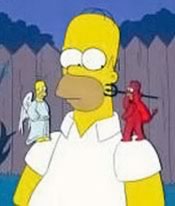An angel on one shoulder and a devil on the other
We received a Costco coupon book in the mail today. Costco — a membership warehouse store — has very low prices and generally does not take coupons. A few times a year, though, they send out flyers with special discounts.
Kris flipped through the book first, clipping coupons for kleenex, cat litter, and ziploc bags. When she was finished, I picked it up to look for things she'd missed.
- On the first page, I nearly tore out a coupon for $6 off a ten-pack of toothbrushes.
- On the next page, I was drawn to a coupon for four pounds of jelly beans.
- Later in the book, I was tempted by a stainless steel slow cooker. (“We already have a slow cooker!” Kris muttered in exasperation when she edited this entry.)
“I've got to stop looking at this,” I said, tossing the coupon book aside.
“What's wrong?” asked Kris.
“It's making want things I don't need. It makes me want to buy junk food and DVDs,” I said.
I thought for a moment. “How can you look at that book and just clip coupons for the things you need? How come when I look through it, I'm tempted to buy things that I know I shouldn't. I don't need jelly beans.”
“I don't know,” Kris said. “I must have a filter that you don't have. You come up with reasons to buy things. I come up with reasons not to buy them.”
She's right. That's exactly how my thought process works. (That's how I think with food, too, but that's a subject for another website.) When I see something appealing — like a four-pound tub of jelly beans — I subconsciously try to talk myself into it. I don't think of the reasons I shouldn't buy it; I think of the reasons I should.  It's like those cartoons where our hero has a devil on one shoulder and an angel on the other, except my angel speaks too softly.
It's like those cartoons where our hero has a devil on one shoulder and an angel on the other, except my angel speaks too softly.
Over the last two years, I've become better at ignoring the devil and listening to the angel. In fact, most of the time I don't even let them begin to argue. When something tempts me, I move on: I leave the store, I close the website, I set down the coupon book. When I sense myself slipping into old thought patterns, I try to remove myself from the situation so that I'm never actually forced to make a choice.
The best part of this isn't that it prevents me from spending money. The best part is that I'm no longer burdened with the guilt that comes with compulsive spending. If you've ever been a spendaholic, you're probably familiar with the knot in the stomach that comes from buying something you shouldn't. You want it on an emotional level, even though your brain is telling you it's a poor decision. I don't have that any more. For the most part, I avoid irrational purchases. And because I'm not spending money, I'm not beating myself up over stupid choices.
Now when I buy something for myself, it's a planned purchase. I know I can afford it. Even when I indulge myself, it feels good because I don't have to feel guilty. And that, my friends, is why I won't be bringing home a four-pound container of jelly beans.
Become A Money Boss And Join 15,000 Others
Subscribe to the GRS Insider (FREE) and we’ll give you a copy of the Money Boss Manifesto (also FREE)
